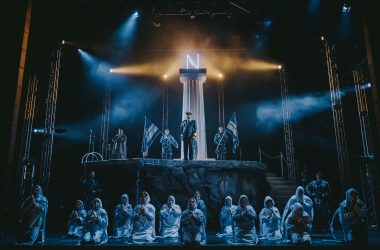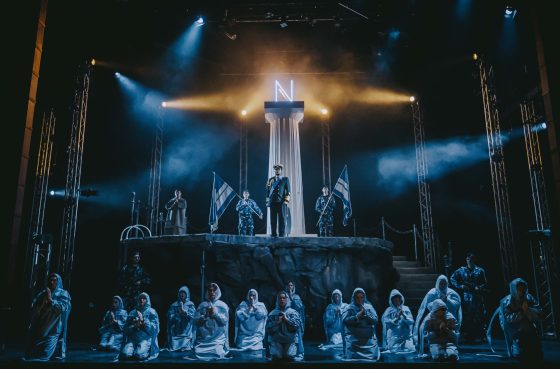 United Kingdom Mozart, Idomeneo: Soloists, Choir and Orchestra of the Royal Conservatoire of Scotland / John Butt (conductor). New Atheneum Theatre, Glasgow, 20.3.2024. (GT)
United Kingdom Mozart, Idomeneo: Soloists, Choir and Orchestra of the Royal Conservatoire of Scotland / John Butt (conductor). New Atheneum Theatre, Glasgow, 20.3.2024. (GT)

Production:
Director – PJ Harris
Set and Costumes designer – Anna Yates
Lighting designer – Kai Fischer
Movement director – Jack Webb
Fight director – Raymond Short
Cast:
Idomeneo – James Schouten (acting) / Aidan Thomas Phillips (singing)
Idamante – Charlotte Bateman
Ilia – Nikki Martin
Elettra – Rosie Lavery
Arbace – Daniel Gray Bell
High Priest – Fanzhuo Wei
Neptune – Joshua McCullogh
First Cretan – Virginia Lafean
Second Cretan – Elizabeth Clarence
First Trojan – Alfred Mitchell
Second Trojan – Tianlong Ding
Chorus Soloists – Roisin Linehan, Parker Millspaugh, William Semple, Reuben Wilmshurt
For his first successful mature opera seria, Mozart used an adaptation of a libretto by Giambattista Varesco from a text by Antoine Danchet and a play by Crébillion père set to music by André Campra as Idoménée in 1712. By a strange quirk of fate, the UK premiere was given at the Theatre Royal in Glasgow on 12 March 1934, the last time it was performed here was by Scottish Opera in a staging by David McVicar on 19 October 1983. In PJ Harris’s production, the first two acts are combined into Part One, while the final third act takes up Part Two.
In recent years, the performances by the Opera Department of the Royal Conservatoire of Scotland of wide-ranging operas have become increasingly popular and invariably adorned by outstanding singing and orchestral playing combined with productions that professional opera companies would be proud of. Immediately impressive was Anna Yates’s opening set of a great rock formation with a Roman column surrounded by a railing, and a ladder to the stage, with staircase leading upwards.
The intensively dramatic overture began as we saw the prequel in which Idomeneo is on his knees before Neptune, who takes his knife and hands him an axe before exiting through the tower column that dominates the scene. Neptune’s subjugation of Idomeneo takes place enshrouded by a misty atmosphere, and there appear guards in modern military dress with Ilia their prisoner. Her ‘Padre, germani, addio’ set the scene well for an evening of outstanding singing. The aria by the Ilia of Nikki Martin was beautiful in its tessitura and strong projection as she was forced to sit against the stairs. The costumes by Anna Yates place the action in the mid-twentieth century and hint at the wars between Turkey and Cyprus.
Cretan soldiers brought on to the stage their Trojan prisoners dressed in orange uniforms, and the Idamante was characterised superbly by the bright expressive soprano of Charlotte Bateman in an impressive portrayal of this challenging role. Idamante dismisses the prisoners, allowing them to be with their families after liberation. Dressed as a naval captain, Arbace informs that Idomeneo has been drowned at sea, however, miraculously he has survived and on his arrival in an admiral’s uniform, he vows to sacrifice the first person he meets (‘Vedrommi intorno’) but the first person he encounters is his daughter Idamante. To save his daughter, Arbace and Idomeneo resolve to dispatch Idamante from Crete to Argos with Elettra, who can reclaim her throne (‘Tutte nel cor vi sento, furie del crudo averno’). As they are about to arrive, a tremendous storm breaks out with terrific sound effects and lighting. Idomeneo now confesses he has broken the pledge to Neptune, and the people flee.

In Part Two, Idamante meets with Ilia before the clash with Neptune and they declare love for each other. They are discovered by Idomeneo who orders Idamante to leave Crete, now the High Priest orders Idomeneo to reveal the sacrificial victim to restore peace to Crete, and that Idomeneo’s son is to be the victim, (‘No, la morte io non pavento’) yet Ilia arrives, and instead of her lover, she magnanimously offers herself as the sacrifice, astonished now Neptune declares love has triumphed and that Idomeneo must concede his throne to Idamante and Ilia. In bringing this terrific raw-edged drama to a close, the final vocal quartet was gloriously sung. The offstage singing for Idomeneo (due to James Schouten’s indisposition) was a little disconcerting, yet this did not take anything away from this outstanding performance showing off the prodigious talent of the principal singers and magnificently supported by a first-class chorus and orchestra under the guidance of John Butt.
The Elettra of Rosie Lavery was the finest singer of the evening with an outstanding characterisation and stage presence added to by her scarlet red costume (her Beatrice in Three Decembers by Jack Heggie was remarkable last year). Her aria ‘D’Oreste, d’Ajace ho in seno i torment’ was glorious in its tessitura and weight of dramatic power. With few opportunities to sing, the Neptune of Joshua McCullough was outstanding in his portrayal of great evil and terrible powers. The sole disappointment was the indisposition suffered by the Idomeneo of James Schouten who acted his role bravely with the offstage singing masterfully synchronised by Aidan Thomas Phillips, whose impressive tenor allowed this performance to proceed successfully.
It was an excellent production by JP Harris and Anna Yates taking a challenging narrative and placing it in a modern environment and making it completely effective. The performance was graced by some of Mozart’s most wonderfully exciting music: the orchestral playing was superb throughout – from the violins to the woodwind, brass, percussion and most notably the magnificent harpsichord playing of John Butt. Several singers can expect outstanding careers in the future, and hopefully, this production will provide a springboard for all the RCS students who made this a great success.
Gregor Tassie
